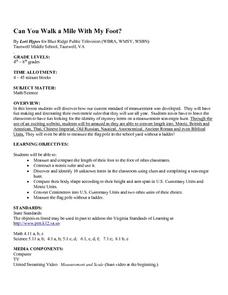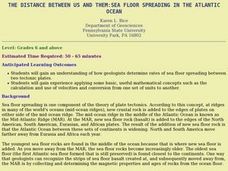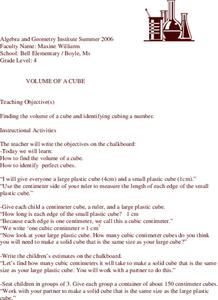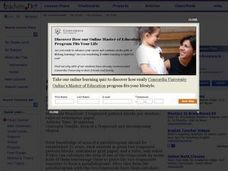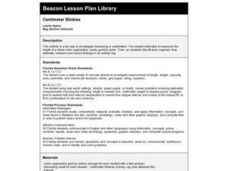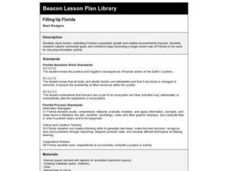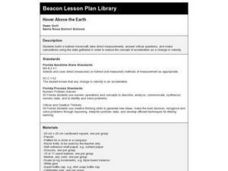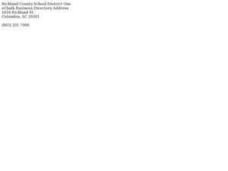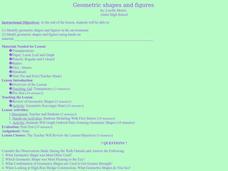Curated OER
Can You Walk a Mile With My Foot?
Students engage in a instructional activity that is concerned with the measurement of a foot as a customary unit. They take part in a series of activities to help them acquire skills of using a foot to compare other units of measurement....
Curated OER
Make a Compare/Contrast Diagram
In this make a compare/contrast diagram worksheet, students use the drawing tools in a word processor to create a diagram by following detailed instructions for each step.
Curated OER
Learning the Letters
Students identify the letters of the alphabet. In this letters lesson plan, students use an iPad to play games, draw pictures, and listen to videos about the alphabet. They use pipe cleaners to create their name.
Curated OER
Perimeter
Students use their hands, feet, computer, and rulers to measure the perimeter of objects. In this measurement lesson plan, students measure objects around the room and computer generated shapes.
Curated OER
Water Lesson Plan
Students discuss the importance of water in our daily lives. In this physics lesson, students calculate the pressure of water tower systems. They investigate the effect of certain variables using a computer simulation.
Curated OER
Can You Measure This?
Fifth graders design their own house, while also using problem-solving skills involving perimeter and area. They exchange houses with a partner and find the perimeter and area of the window, doors, and front side of the house.
Curated OER
The Distance Between Us and Them: Sea Floor Spreading in the Atlantic Ocean
Students examine how geologists determine rates of sea floor spreading between two tectonic plates. They apply mathematical concepts such as the calculation and use of velocities and conversion from one set of units to another.
Curated OER
A Point of Intersection
Pupils factor and solve systems of equation. In this algebra lesson, students identify the point of intersection using substitution, elimination and graphing. They write an equation given a system and a graph.
Curated OER
Volume Of A Cube
Fourth graders find the volume of cubes and cylinders. To determine volume, they fill large cubes with centimeter cubes. They discuss the formula used to find the volume of a cube. Students explore why the solution to the volume of a...
Curated OER
Why Do We Add The Bases To Find The Area of A Trapezoid?
Students are given patterns of trapezoids and are to calculate the area of one trapezoid by using both patterns. They should form a parallelogram and calculate the area. They practice this technique until there is understanding.
Curated OER
Personal Possessive Pronoun Practice
In this personal pronouns practice worksheet, students respond to 20 fill in the blank and 4 short answer questions regarding the use of yours, hers, ours, his, and theirs.
Curated OER
It's So Simple
Learners use basic materials to create four simple machines. For this introduction to simple machines lesson, students are given four different scenarios that require a simple machine in order to solve. The learners use devices such as a...
Curated OER
Nets, Surface Area and Volume
Students calculate the surface area and volume of a sphere. For this geometry lesson, students define nets, surface areas and volume of prisms, pyramids, cylinders and cones. They use the computer to create nets and analyze shapes.
Curated OER
The King's Slice
Students participate in an experiment involving the square root of two. They use different methods to solve the problem.
Curated OER
Properties of Matter
Third graders explore forms of matter through reading, hands-on science activities, and research using the Internet. Students create a booklet, directions given, that they title and decorate, to later serve as a review visualization...
Curated OER
Making An Anemometer
Young scholars discover how to capture the speed of wind. In this science activity lesson, students gather materials and follow procedures to create an anemometer to measure wind speed.
Curated OER
Centimeter Slinkies
Third graders estimate and measure the length of a whole color-segmented, candy gummy worm. Then, as students bite off each segment, they estimate, measure and record findings in an activity log.
Curated OER
Filling Up Florida
Students study factors controlling Florida's population growth and related environmental impacts. They research natural community types and construct maps (including a large-sized map of Florida) to be used for a simulation activity.
Curated OER
Hover Above the Earth
Fourth graders build a balloon hovercraft, take direct measurements, answer critical questions, and make calculations using the data gathered in order to see the concept of acceleration as a change in velocity. They use a worksheet...
Curated OER
Criteria and Constraints in Aircraft Design
Students investigate criteria and constraints for designing any aircraft. They define these terms and categorize a series of examples of both. Using the constraints and criteria set before them, they design and construct airplanes in...
Curated OER
Tessellations
Seventh graders investigate geometric shapes using tessellations. In this geometry lesson, 7th graders practice tessellations using different shapes. They create different designs using tessellations.
Curated OER
Scientific Graphs
Learners organize data collected from their experiments using graphs. In this statistics and biology lesson, students organize their scientific data from an article into readable graphs. They define the usefulness of their graph and...
Curated OER
Geometric Shapes And Figures
Learners compete in a scavenger hunt to find twenty-two different geometric shapes in natural objects around the school. They practice identification of each geometric shape using a handout then form small groups to search the school...
Curated OER
Magnets and Springs
Students explore magnetic attraction. In this magnets lesson, students participate in an interactive whiteboard activity in which objects are dragged onto a virtual table and categorized as to whether they are "repelled" or "attracted"...
